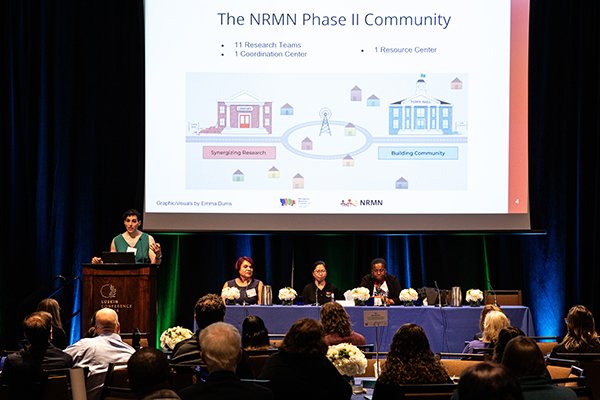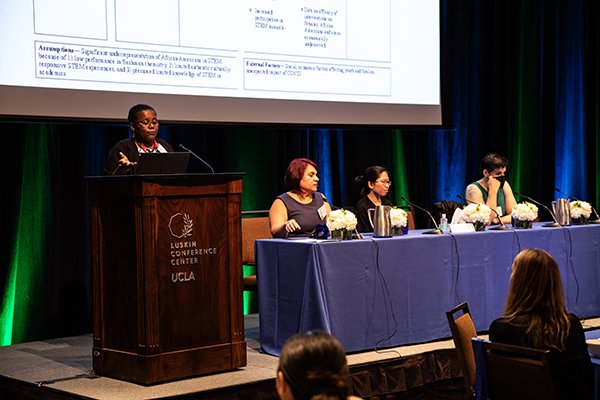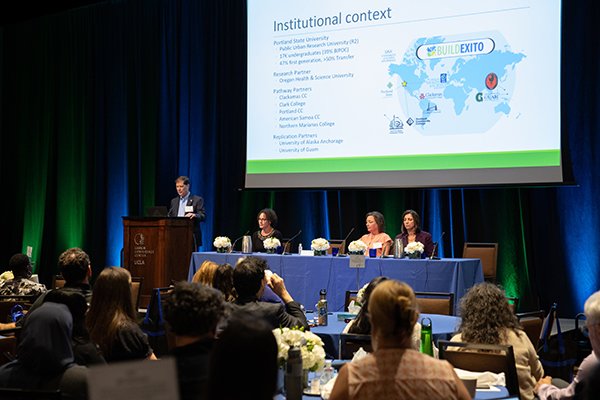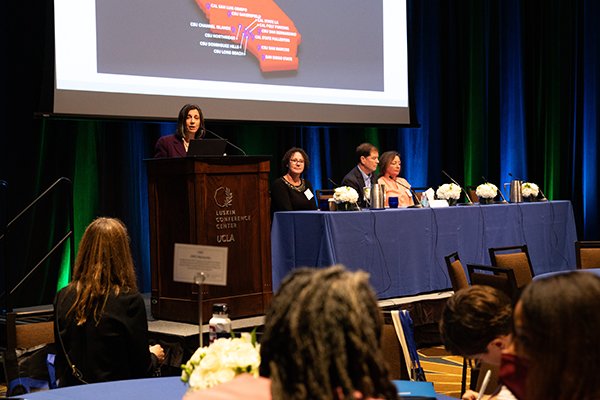DPC leaders share insights during panel sessions at 2023 Annual Conference
By Melissa Simon
July 26, 2023
Nearly 200 people attended the 2023 Diversity Program Consortium (DPC) Annual Grantees Conference in-person and virtually to celebrate the consortium’s accomplishments and share in the legacy of the work done over the last decade.
As part of the three-day conference from June 26 to 28, consortium members participated in two panel discussions, with the first highlighting how to advance effective approaches and successful initiatives, and the second looking at moving the effort of the DPC forward.
Effective approaches and successful initiatives
Gabriela Chavira, PhD, from the California State University, Northridge BUILD PODER program, moderated a panel titled “Advancing effective approaches across student, faculty and institutional impacts.” The discussion featured Oluwatoyin Asojo, PhD, from Hampton University (DPC DaTA); Fátima Sancheznieto, PhD, from the University of Wisconsin-Madison (NRMN Coordination Center); and Kim Vu, PhD, from California State University, Long Beach (BUILD).
Vu shared about two student training modules created by CSULB BUILD staff that provided guidance on applying to graduate schools and summer research experiences.
Both programs are now being used by CSULB’s Office of Undergraduate Research Services and are available at all 23 CSU campuses as of Spring 2023. It’s also offered virtually through the MyNRMN online mentoring platform.

From left to right: Fátima Sancheznieto, PhD, Gabriela Chavira, PhD, Kim Vu, PhD, and Oluwatoyin Asojo, PhD.
“We continue to use them because students say they love these modules. They can view them at their own time, at their own pace on any device [and] they can review the modules if they need to,” Vu said.
CSULB BUILD also created the training program Advancing Inclusive Mentoring (AIM) for faculty professional development that features videos of best practices and allows participants to share expertises and experiences, and to problem-solve.
As for training at Hampton University, Asojo said their DPC DaTA project had three main aims: establishing a Student-Centered Active Learning Environment with Upside-down Pedagogy (SCALE-UP), creating a Course-based Undergraduate Research Experiences (CUREs), and supporting faculty development through enhanced training and mentorship.
Their focus on strategic partnerships and activities that would yield medium- and long-term impacts from the U01 grant funding has resulted in enhanced facilities and equipment, institutional support and more opportunities for collaboration, she said.

From left to right: Oluwatoyin Asojo, PhD, Gabriela Chavira, PhD, Kim Vu, PhD, and Fátima Sancheznieto, PhD.
“Having a U01 is a really exciting way to broaden participation beyond the way we were originally anticipating, so research was a part where we really were able to shine,” Asojo said.
She added that work is ongoing because they are analyzing student success in research and classroom engagement, as well as faculty development.
The NRMN Coordination Center has been synergizing research by supporting common data collection, identifying collaboration opportunities, tracking surveys and research activities, and communicating this data to the 11 NRMN research teams, Sancheznieto said. They’ve also been building community by hosting working groups, research managers meetings and monthly webinars.
The NRMN Coordination Center has been synergizing research by supporting common data collection, identifying collaboration opportunities, tracking surveys and research activities, and communicating this data to the 11 NRMN research teams, Sancheznieto said. They’ve also been building community by hosting working groups, research managers meetings and monthly webinars.
While data is limited to what research managers share with the NRMN CC and enrollment numbers and goals are continuously changing based on team needs, by September 2022, the NRMN CC estimated NRMN had engaged 6,048 participants, roughly 87% of the collective teams’ enrollment goal.
“This is where we are as a group, collectively, [because] this is where you all are and how we're doing,” Sancheznieto said, adding that participation included 11 NRMN research teams that have engaged intervention participants across 345 institutions/organizations nationwide.
The research collected over the years is a “powerful data set” that the NRMN is excited to continue fostering and analyzing, Sancheznieto said.
Creating and sustaining impacts
Nicole Maccalla, PhD, from the Coordination & Evaluation Center at the University of California, Los Angeles, moderated a second panel, titled “Moving the effort of the consortium forward,” that looked at the unique ways members are creating and sustaining impacts for the biomedical research community. The panel featured Dorota Huizinga, PhD, from California State University, San Bernardino (SPAD); Thomas Keller, PhD, from Portland State University (BUILD); and Doris Rubio, PhD, from the University of Pittsburgh (NRMN U01).
Keller gave an overview of the BUILD EXITO program at PSU which has a “comprehensive three-year developmentally sequenced training model” at the center that includes a preparation stage and a trainee stage, followed by interventions like curricular enhancements, multi-level mentoring and research placement.
“We've developed a lot of capacity with the proper amount of staffing required to serve students and train students . . . and we've gained knowledge and experience about those intervention approaches, so what is effective in working with students,” Keller said.
He added the program leadership plans to continue their efforts by securing new sources of funding, providing administrative staff with training support, creating a student opportunity hub, connecting faculty and community partners, and fostering a culture of undergraduate internship, mentoring and research.

From left to right: Thomas Keller, PhD, Nicole Maccalla, PhD, Doris Rubio, PhD, and Dorota Huizinga, PhD.
Rubio shared that the key goals of her NRMN U01 Building Up study was to conduct a trial testing two different models of intervention, look at what factors impacted participants and then disseminate the Building Up Intervention to other institutions.
The success of the trial is evident in the response emails from participants who say this program was the “best thing” that happened to them or allowed a “much-needed opportunity for underrepresented biomedical researchers,” among other comments, she said.
“That just shows you the considerable need for a program like this and . . . it's been a game-changer for [the participants],” Rubio said.

From left to right: Dorota Huizinga, PhD, Nicole Maccalla, PhD, Thomas Keller, PhD, and Doris Rubio, PhD.
For Huizinga, the CSUSB SPAD program focused on two things: reorganizing sponsored programs and also enhancing research development. The program’s accomplishments have included seeing an increase in both proposals and funds awarded, as well as the addition of an external evaluator that conducts surveys and analyzes data, she said.
Huizinga said sustainability achievements include three different types of certificates, each with five or six workshops, and an IRB series that has two workshops.
“I wanted to acknowledge our NIH leaders over here and I honestly think that it's a brilliant idea that this grant is going to continue . . . because this particular funding and opportunity was, I believe, truly transformational for our campus,” she said.
Visit the conference website to view the conference program and other materials, and to read about the moderators and panelists who presented. Recordings of all sessions can be requested by emailing info@diversityprogramconsortium.org.
This story is included in the Volume 8, Issue 2 of the DPC Newsletter — “Moving the Efforts of the DPC Forward"
The Diversity Program Consortium Coordination and Evaluation Center at UCLA is supported by Office of the Director of the National Institutes of Health / National Institutes of General Medical Sciences under award number U54GM119024.

Grow Together.